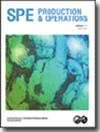Produced-Water Reinjection in Deep Offshore Miocene Reservoirs, Block 17, Angola
IF 1.4
4区 工程技术
Q2 ENGINEERING, PETROLEUM
引用次数: 7
Abstract
In this paper we examine the changes in the injectivity of wells reinjecting produced water in two fields from Block 17, offshore Angola. This analysis suggests that the water quality has a direct impact on well injectivity during matrix injection. Well impairment caused by desulfated seawater treated with membrane technology appears immaterial in comparison with the injectivity declines observed during produced-water reinjection (PWRI). The decline rate is much quicker for the field with the worst quality of treated produced water. Injectivity enhancements observed during seawater-injection tests demonstrate that the matrix decline is partially reversible. However, permanent damage also develops with time; it is not possible to recover the initial injectivity after a long period of injection with produced water. The analysis also shows that fracture injection can effectively mitigate the strong injectivity declines experienced in the field with the worst quality of treated produced water. Fracture injection comes with higher injection pressures, even when operating the wells at low flow rates. As a result, the injectivity index (II), as conventionally defined, displays a strong flow-rate dependency, making it inappropriate for measuring the well performance in fracture condition. Besides the limitations of the high injection pressures, fracture injection was found detrimental to injection conformance in wells with commingled water injection in several reservoir layers. In this situation, most of the injection is thought to take place in the shallowest layer where the fracture is likely to grow, leaving little injection for deeper reservoir layers.安哥拉17区块深海中新世油藏采出水回注
在本文中,我们研究了安哥拉近海17区块两个油田重新注入采出水的井的注入能力的变化。该分析表明,在基质注入过程中,水质对井的注入能力有直接影响。与采出水回注(PWRI)期间观察到的注入能力下降相比,用膜技术处理的脱硫海水造成的油井损害似乎无关紧要。对于处理过的采出水质量最差的油田,下降速度要快得多。海水注入试验期间观察到的注入性增强表明基质的下降是部分可逆的。然而,永久性损害也会随着时间的推移而发展;在长时间注入采出水之后,不可能恢复初始注入能力。分析还表明,裂缝注入可以有效缓解处理后气田水质量最差的油田所经历的强烈注入能力下降。裂缝注入具有更高的注入压力,即使在低流速下操作井时也是如此。因此,传统定义的注入率指数(II)显示出强烈的流量依赖性,不适合在裂缝条件下测量井的性能。除了高注入压力的限制外,在多个储层中混合注水的井中,裂缝注入也不利于注入的一致性。在这种情况下,大多数注入被认为发生在裂缝可能生长的最浅层,而留给更深储层的注入很少。
本文章由计算机程序翻译,如有差异,请以英文原文为准。
求助全文
约1分钟内获得全文
求助全文
来源期刊

Spe Production & Operations
工程技术-工程:石油
CiteScore
3.70
自引率
8.30%
发文量
54
审稿时长
3 months
期刊介绍:
SPE Production & Operations includes papers on production operations, artificial lift, downhole equipment, formation damage control, multiphase flow, workovers, stimulation, facility design and operations, water treatment, project management, construction methods and equipment, and related PFC systems and emerging technologies.
 求助内容:
求助内容: 应助结果提醒方式:
应助结果提醒方式:


